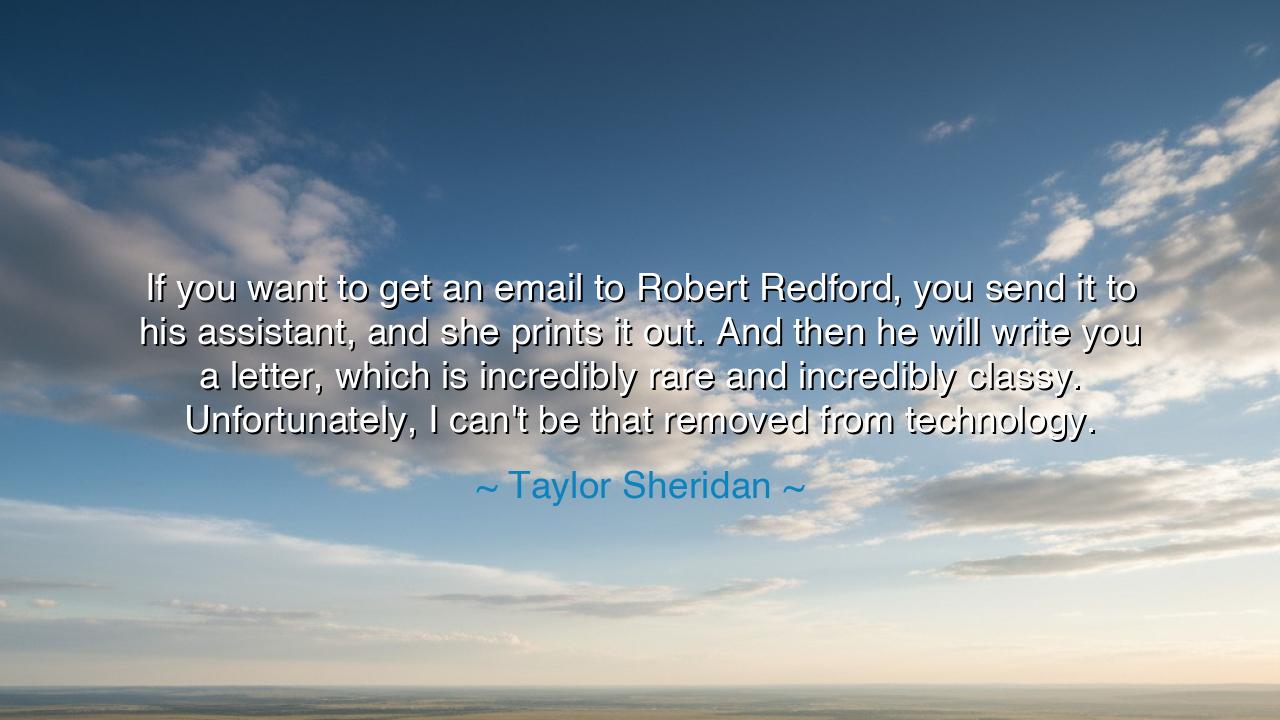
If you want to get an email to Robert Redford, you send it to
If you want to get an email to Robert Redford, you send it to his assistant, and she prints it out. And then he will write you a letter, which is incredibly rare and incredibly classy. Unfortunately, I can't be that removed from technology.






Hear the words of Taylor Sheridan, a voice of our age caught between old and new: “If you want to get an email to Robert Redford, you send it to his assistant, and she prints it out. And then he will write you a letter, which is incredibly rare and incredibly classy. Unfortunately, I can’t be that removed from technology.” In this reflection lies not merely a tale of two men, but the tension of generations—the reverence for the enduring grace of the past and the unavoidable pull of the digital present.
In Redford’s practice of the handwritten letter, there is something ancient and noble. A letter bears the mark of the hand, the rhythm of thought slowed by pen and ink, the intimacy of time given wholly to another. It carries not only words, but weight—the weight of sincerity, of permanence, of a human touch unfiltered by machines. Sheridan calls it rare and classy because in a world drowned by instant communication, the letter shines like a jewel, a reminder that true connection cannot always be rushed or digitized.
Yet Sheridan confesses his own struggle: “I can’t be that removed from technology.” Here lies the mark of our age. Where once men measured time by seasons, now they measure it by seconds. Where once correspondence traveled by courier, now it flashes across the globe in the blink of an eye. To withdraw from this tide is nearly impossible, for work, survival, and relevance demand participation. The grace of distance, once natural, has become a luxury few can afford.
History shows us this cycle of change. When the printing press was born, many lamented the loss of oral storytelling, fearing that the spoken word would die. When the telephone was invented, some scorned it as cold and impersonal compared to face-to-face conversation. And yet, in each age, some preserved the old ways even as the new triumphed. Redford, in his devotion to the letter, stands in that lineage, guarding the dignity of slowness while the world races forward.
Consider also Abraham Lincoln, who wrote letters that still move the soul. His words, carved by hand in the silence of night, carried a power beyond policy; they carried his humanity. Could such words have struck as deeply had they been dashed off in haste on a glowing screen? Perhaps not. This is the lesson hidden in Sheridan’s admiration: that while technology makes connection faster, it does not always make it deeper. The enduring power lies not in speed, but in sincerity.
Thus the meaning of Sheridan’s words becomes clear: the old ways of patience and presence hold a sacredness that must not be forgotten, even as we embrace the conveniences of the present. Though few of us can retreat fully from technology, we can still preserve the virtues of slowness, thoughtfulness, and authenticity in our interactions. The pen may be replaced by the keyboard, but the spirit of the letter—the spirit of care—can yet live on if we choose it.
The lesson is plain: do not let technology steal the humanity of your connection. When you write, write with presence, whether in ink or pixels. Take the time to mean what you say, to give of yourself, not just your words. Practice the art of slowing down—send a note, a letter, or a message crafted with intention. For it is not the medium that defines class and rarity, but the heart behind it.
So let Sheridan’s words linger: The letter is rare, but its spirit need not be lost. Let us learn from Redford the grace of thoughtfulness, and from Sheridan the honesty of navigating the modern world. And let us, in our own lives, refuse to let speed replace sincerity, or convenience diminish care. For though we may not escape technology, we can still choose to remain human within it.






AAdministratorAdministrator
Welcome, honored guests. Please leave a comment, we will respond soon